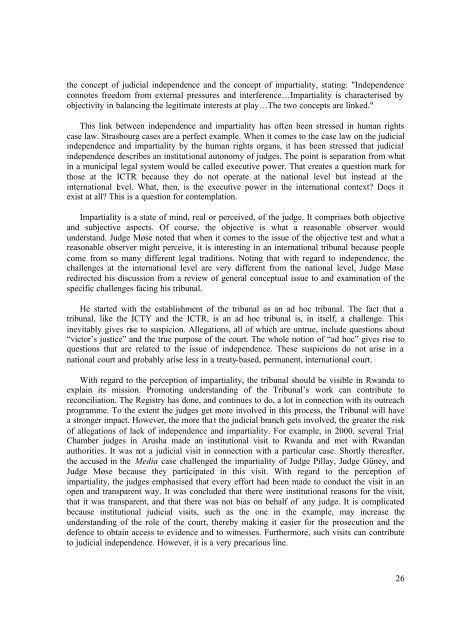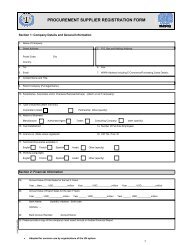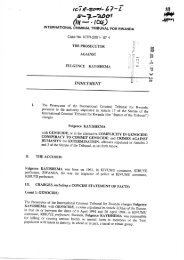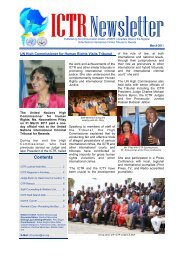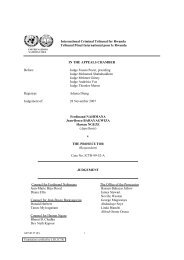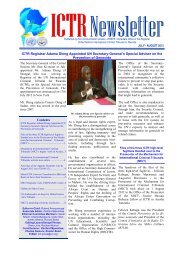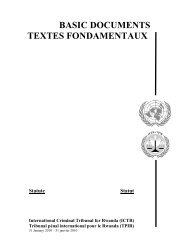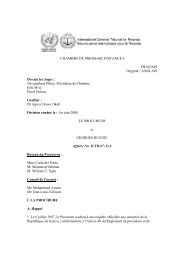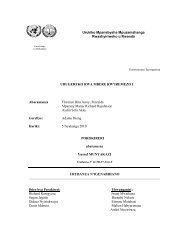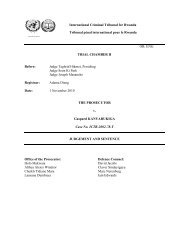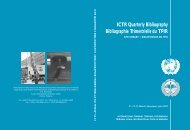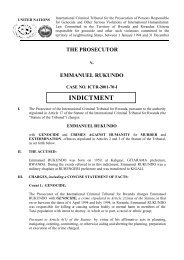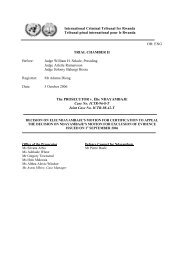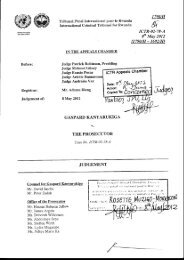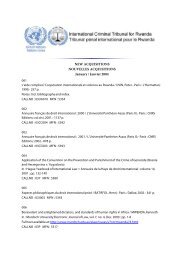Report of Proceedings - International Criminal Tribunal for Rwanda
Report of Proceedings - International Criminal Tribunal for Rwanda
Report of Proceedings - International Criminal Tribunal for Rwanda
Create successful ePaper yourself
Turn your PDF publications into a flip-book with our unique Google optimized e-Paper software.
the concept <strong>of</strong> judicial independence and the concept <strong>of</strong> impartiality, stating: "Independence<br />
connotes freedom from external pressures and interference…Impartiality is characterised by<br />
objectivity in balancing the legitimate interests at play…The two concepts are linked."<br />
This link between independence and impartiality has <strong>of</strong>ten been stressed in human rights<br />
case law. Strasbourg cases are a perfect example. When it comes to the case law on the judicial<br />
independence and impartiality by the human rights organs, it has been stressed that judicial<br />
independence describes an institutional autonomy <strong>of</strong> judges. The point is separation from what<br />
in a municipal legal system would be called executive power. That creates a question mark <strong>for</strong><br />
those at the ICTR because they do not operate at the national level but instead at the<br />
international level. What, then, is the executive power in the international context? Does it<br />
exist at all? This is a question <strong>for</strong> contemplation.<br />
Impartiality is a state <strong>of</strong> mind, real or perceived, <strong>of</strong> the judge. It comprises both objective<br />
and subjective aspects. Of course, the objective is what a reasonable observer would<br />
understand. Judge Møse noted that when it comes to the issue <strong>of</strong> the objective test and what a<br />
reasonable observer might perceive, it is interesting in an international tribunal because people<br />
come from so many different legal traditions. Noting that with regard to independence, the<br />
challenges at the international level are very different from the national level, Judge Møse<br />
redirected his discussion from a review <strong>of</strong> general conceptual issue to and examination <strong>of</strong> the<br />
specific challenges facing his tribunal.<br />
He started with the establishment <strong>of</strong> the tribunal as an ad hoc tribunal. The fact that a<br />
tribunal, like the ICTY and the ICTR, is an ad hoc tribunal is, in itself, a challenge. This<br />
inevitably gives rise to suspicion. Allegations, all <strong>of</strong> which are untrue, include questions about<br />
“victor’s justice” and the true purpose <strong>of</strong> the court. The whole notion <strong>of</strong> “ad hoc” gives rise to<br />
questions that are related to the issue <strong>of</strong> independence. These suspicions do not arise in a<br />
national court and probably arise less in a treaty-based, permanent, international court.<br />
With regard to the perception <strong>of</strong> impartiality, the tribunal should be visible in <strong>Rwanda</strong> to<br />
explain its mission. Promoting understanding <strong>of</strong> the <strong>Tribunal</strong>’s work can contribute to<br />
reconciliation. The Registry has done, and continues to do, a lot in connection with its outreach<br />
programme. To the extent the judges get more involved in this process, the <strong>Tribunal</strong> will have<br />
a stronger impact. However, the more that the judicial branch gets involved, the greater the risk<br />
<strong>of</strong> allegations <strong>of</strong> lack <strong>of</strong> independence and impartiality. For example, in 2000, several Trial<br />
Chamber judges in Arusha made an institutional visit to <strong>Rwanda</strong> and met with <strong>Rwanda</strong>n<br />
authorities. It was not a judicial visit in connection with a particular case. Shortly thereafter,<br />
the accused in the Media case challenged the impartiality <strong>of</strong> Judge Pillay, Judge Güney, and<br />
Judge Møse because they participated in this visit. With regard to the perception <strong>of</strong><br />
impartiality, the judges emphasised that every ef<strong>for</strong>t had been made to conduct the visit in an<br />
open and transparent way. It was concluded that there were institutional reasons <strong>for</strong> the visit,<br />
that it was transparent, and that there was not bias on behalf <strong>of</strong> any judge. It is complicated<br />
because institutional judicial visits, such as the one in the example, may increase the<br />
understanding <strong>of</strong> the role <strong>of</strong> the court, thereby making it easier <strong>for</strong> the prosecution and the<br />
defence to obtain access to evidence and to witnesses. Furthermore, such visits can contribute<br />
to judicial independence. However, it is a very precarious line.<br />
26


